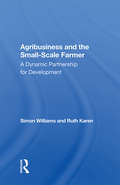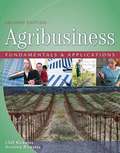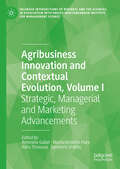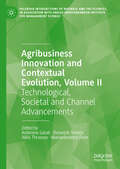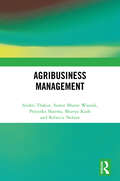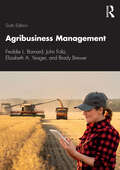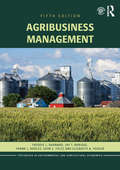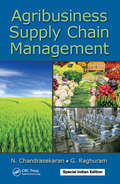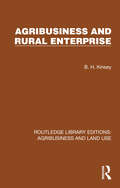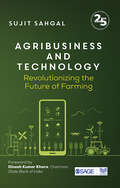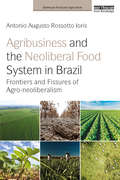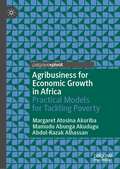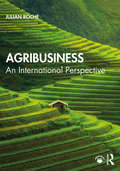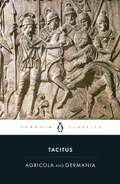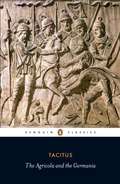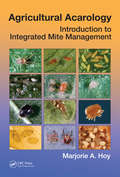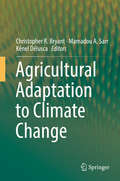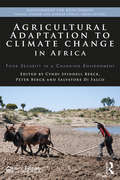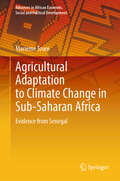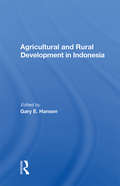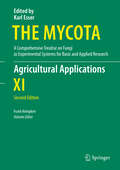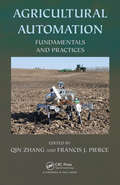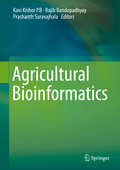- Table View
- List View
Agribusiness And The Small-scale Farmer: A Dynamic Partnership For Development
by Simon Williams Ruth KarenBased on case histories from nine Third World countries, this study examines the successful cooperation between private agribusiness firms and small farmers to increase agricultural production and income in developing countries. In such ventures, small farmers are organized around a core private company that buys their output and provides manageria
Agribusiness Fundamentals and Applications
by Cliff Ricketts Kristina RickettsNIMAC-sourced textbook
Agribusiness Innovation and Contextual Evolution, Volume I: Strategic, Managerial and Marketing Advancements (Palgrave Intersections of Business and the Sciences, in association with Gnosis Mediterranean Institute for Management Science)
by Demetris Vrontis Alkis Thrassou Antonino Galati Mariantonietta FioreAgriculture is the oldest and most traditional of economic sectors, and its business has seen major evolutionary leaps over the past century. Contemporary agribusiness is being influenced and reshaped by technological advancements, geopolitical developments, globalisation, transport and logistics innovations, as well as changes in industry structure and consumer behaviour. Reflecting on these changes and providing a deep dive into this sector, this two-volume scientific works’ collection defines, refines, analyses, and prescribes the evolution of agribusiness in the present and future. Taken together, the books offer a comprehensive conceptualisation of the multifactorial macro, micro and organisational elements of agribusiness, including strategic, managerial, marketing, technological and geo-socio-political forces. Volume I explores the strategic, managerial and marketing aspects of contemporary agribusiness, and descriptively and prescriptively investigates the organisational and immediate industry practices and sectoral forces. Topics covered include circular business models, CSR communication practices, digital marketing, organisational sustainability and contemporary farming systems, to name a few..
Agribusiness Innovation and Contextual Evolution, Volume II: Technological, Societal and Channel Advancements (Palgrave Intersections of Business and the Sciences, in association with Gnosis Mediterranean Institute for Management Science)
by Demetris Vrontis Alkis Thrassou Antonino Galati Mariantonietta FioreAgriculture is the oldest and most traditional of economic sectors, and its business has seen major leaps in innovation over the past century. Contemporary agribusiness is being influenced and reshaped by technological developments, geopolitical developments, and globalisation, as well as transport and logistics innovations, changes in consumer behaviour.Reflecting on these changes and providing a deep dive into this sector, this two-volume work defines, refines, analyses, and prescribes the evolution of agribusiness in the present and future. Taken together, the books offer a comprehensive conceptualisation of the multifactorial macro, micro and organisational elements of agribusiness, including strategic, managerial, marketing, technological and geo-socio-political forces.Volume II focuses on the wider, macro-environmental forces acting upon agribusinesses, exploring the contextual evolutions that impact the sector, and the means, practices and avenues for its development.It includes topics such as digital technologies adoption, supply chain sustainability, big data analytics, women’s agricultural entrepreneurship, and simulation model decision making.
Agribusiness Management
by Priyanka Sharma Srishti Thakur Sumit Bharat Wasnik Bhavya Kush Rebecca NelsonThis book serves as a guide to understanding the intricacies and challenges of managing agribusiness enterprises in the modern era. It covers the fundamentals of agribusiness management and discusses the trends and emerging issues. Through real-world case studies and practical examples, this book aims to bridge the gap between theory and practice, enabling the reader to apply their knowledge in diverse agribusiness contexts.Print edition not for sale in South Asia (India, Sri Lanka, Nepal, Bangladesh, Pakistan and Bhutan)
Agribusiness Management
by Elizabeth A. Yeager Freddie L. Barnard John Foltz Brady BrewerThis sixth edition of Agribusiness Management provides students and managers with a fundamental understanding of the key concepts needed to successfully manage agribusinesses in a rapidly changing, high-tech, consumer-oriented, and uncertain world. The text uses four specific approaches to help readers develop and enhance their capabilities as agribusiness managers. First, it offers a contemporary focus that reflects the issues that agribusiness managers face today and are likely to face tomorrow. Second, the book presents conceptual material in a pragmatic way with illustrations and examples that will help the reader understand how a specific concept works in practice. Third, the book has a decision-making emphasis, providing contemporary tools that readers will find useful when making decisions in the contemporary business environment. Finally, Agribusiness Management offers a pertinent set of discussion questions and case studies that will allow the reader to apply the material covered in real-world situations. This edition has been updated throughout with new examples and data, as well as additional material on succession planning and managing human resources. This book is an ideal text for all courses on management in the agribusiness industry. The work is fully supported by a Companion Website which provides users with additional materials such as multiple choice questions, discussion questions, and PowerPoint slides for each chapter.
Agribusiness Management (Routledge Textbooks in Environmental and Agricultural Economics #4)
by Elizabeth A. Yeager Jay T. Akridge Freddie L. Barnard Frank J. Dooley John C. FoltzToday's food and agribusiness managers operate in a rapidly changing, highly volatile, international, high technology, consumer-focused world. Agribusiness Management helps prepare students and managers for a successful career in this new world of food and fiber production and marketing. This text uses four specific approaches to help readers develop and enhance their capabilities as agribusiness managers. First, it offers a contemporary focus that reflects the issues that agribusiness managers face today and are likely to face tomorrow. Second, the book presents conceptual material in a pragmatic way with illustrations and examples that will help the reader understand how a specific concept works in practice. Third, the book has a decision-making emphasis, providing contemporary tools that readers will find useful when making decisions in the contemporary business environment. Finally, Agribusiness Management offers a pertinent set of discussion questions and case studies that will allow the reader to apply the material covered in real-world situations. This fifth edition of Agribusiness Management has been updated throughout and continues to provide students and adult learners with an essential understanding of what it takes to be a successful agribusiness manager in today's rapidly evolving, highly unpredictable marketplace.
Agribusiness Management and Entrepreneurship (Third Edition)
by Michael E. Newman Walter J. WillsAgribusiness Management and Entrepreneurship is intended to fill the need for a basic textbook covering the planning, organizing, and managing of an operation; as well as provide a comprehensive source for those who wish to consider a business from the ownership point of view, specifically as it relates to the vast area of agribusiness.
Agribusiness Supply Chain Management
by N. Chandrasekaran G. RaghuramThe agribusiness supply chain includes a number of processes such as supply management, production management, and demand management to customers through a competitive distribution channel. Each step of the way can be plagued with issues such as diversity of production and demand, bulkiness of produce, perishability, and seasonality. Highlighting t
Agribusiness and Rural Enterprise (Routledge Library Editions: Agribusiness and Land Use #25)
by B. H. KinseyOriginally published in 1987 and now reissued with a new Preface by the author, this book is written primarily for planners, public administrators and project managers in countries or international agencies considering a development strategy in which agribusiness and rural enterprise projects are viewed as a desirable policy instrument for generating employment and income. It makes available the background and methodology of project analysis so that agribusiness and rural enterprise project can be designed, implemented and reviewed effectively in a wide range of circumstances. It outlines how to establish objectively the potential and limitations of agribusiness and rural enterprise projects; provides guidelines for deciding whether a project can be effective; considers the policy issues relating to such projects and suggests techniques for judging project performance.
Agribusiness and Technology: Revolutionizing the Future of Farming
by Sujit SahgalThe future of farming is here. Countries all over the world are racing to revolutionize farming. Indian agricultural sector, however, is facing several challenges and needs a makeover. India should adopt agritech to make farming lucrative on a sustained basis and liberate its farmers. Based on the author’s grassroot level discussions with thousands of farmers, entrepreneurs and policymakers, and a deep study of global trends, Agribusiness and Technology deliberates on the future of farming in India. It takes into consideration the farmers’ views and pain points, and pitches modern methods, best practices, effective business models and the use of technology as the best solution to make farming more lucrative, even for the small farmer. It provides a pathway for an early and impactful adoption of the various solutions. The book will speak to all—social entrepreneurs, venture capital investors, farmers, policymakers and students invested in the Indian agricultural sector and agribusiness.
Agribusiness and the Neoliberal Food System in Brazil: Frontiers and Fissures of Agro-neoliberalism (Earthscan Food and Agriculture)
by Antonio Augusto IorisDue to new production areas and persistent productivity gains, Brazil has consolidated its position as a global leader and even as a ‘model’ of commercial, integrated crop production. The country is now seen as an agricultural powerhouse that has a lot to offer in terms of reducing the prospect of a looming, increasingly global, food crisis. Agribusiness and the Neoliberal Food System in Brazil focuses on the intensification of Brazilian agribusiness as a privileged entry point into the politicised geography of globalised agri-food. Drawing on rich empirical analysis based around three fieldwork campaigns in the state of Mato Grosso, the book examines the connections between farming, markets and the apparatus of the state. The importance of agribusiness expansion within the wider politico-economic context of Brazilian neoliberalism is demonstrated, thus drawing broader conclusions about the main trends of agribusiness in the world today and providing recommendations for future research. This book will be of great interest to students and scholars of agribusiness, neoliberalism and global food production, as well as those interested in Brazil and Latin America more generally.
Agribusiness for Economic Growth in Africa: Practical Models for Tackling Poverty (Palgrave Advances in Bioeconomy: Economics and Policies)
by Abdul-Razak Alhassan Mamudu Abunga Akudugu Margaret Atosina AkuribaThis book provides exclusive information on how agribusinesses could act as the springboard for inclusive economic growth critical for socioeconomic transformation of Africa. It is a must read for academics, practitioners, policymakers, students, and all those interested in the application of practical models capable of tackling the endemic poverty situation in Africa using agribusiness as the launchpad. The book emphasizes the urgent need for robust and inward-looking enabling policy frameworks to help remove existing constraints on agro-industrialization and encourage investments. Thus, the book sets the agenda for the right combination of agricultural, industrial, and trade policies critical in promoting sustainable agricultural commodity value chains and food systems for inclusive growth and poverty reduction. Written in a simple, plain, and accessible language devoid of technical jargons, the book makes an interesting read for even the non-expert and is a valuable reference material for academic and practical training of students and practitioners.
Agribusiness: An International Perspective
by Julian RocheAgribusiness offers a unique introduction to the business of agriculture: what agribusiness is, why it matters, what the role of technology is, how trade fits into the picture, what its key risks are, who is lending and investing and why, and what returns they are getting. It is both practical in orientation – focusing on the role of managers in the industry as well as that of lenders and investors – and international in scope – drawing on case studies and interviews with key figures all over the world. The text ranges across various agricultural commodities to stress that there is no ‘one size fits all’ solution and successful management, lending or investment in agribusiness requires understanding specifics. Readers are introduced to the economics of the supply and demand of food, the role of agricultural trade, agricultural marketing and farm management along with key business aspects including: Main drivers of agribusiness value; Principal risks of agribusinesses; Agribusiness as an investment class; and Agribusiness lending: why, who and how. This engaging textbook offers a complete guide to the international business of agriculture which is ideal for all students, scholars and practitioners. A selection of eResources is also available to supplement this text, and instructors will find PowerPoint slides, discussion questions, case studies and further teaching materials available to them.
Agricola and Germania
by TacitusThe Agricola is both a portrait of Julius Agricola - the most famous governor of Roman Britain and Tacitus' well-loved and respected father-in-law - and the first detailed account of Britain that has come down to us. It offers fascinating descriptions of the geography, climate and peoples of the country, and a succinct account of the early stages of the Roman occupation, nearly fatally undermined by Boudicca's revolt in AD 61 but consolidated by campaigns that took Agricola as far as Anglesey and northern Scotland. The warlike German tribes are the focus of Tacitus' attention in the Germania, which, like the Agricola, often compares the behaviour of 'barbarian' peoples favourably with the decadence and corruption of Imperial Rome.
Agricola and the Germania (Penguin Classics)
by Tacitus Harold Mattingly James RivesAgrícola is a tribute to an admired father-in-law, whose greatest accomplishment was his role in the Roman conquest of Britain, and Germania is a description of the peoples who lived beyond the Rhine and the upper Danube, the boundaries of the Roman empire in western Europe. These two short works, dating to AD 97-81 were the first historically oriented compositions of Tacitus, who would go on to become one of the greatest historians of ancient Rome.
Agricultural Acarology: Introduction to Integrated Mite Management
by Marjorie A. HoyWritten by a globally prominent entomologist, Agricultural Acarology: Introduction to Integrated Mite Management provides tools for developing integrated mite management programs for agriculture, including management of plant-feeding mites, mites attacking bees and livestock, and stored products. Emphasizing the biology, ecology, behavior, and diverse methods of controlling mites, this book provides an overview of the management of agriculturally important mites using all available Integrated Pest Management (IPM) tools, including biological control, cultural practices, host-plant resistance, and pesticides.Agricultural Acarology prepares agricultural managers to identify, manage, and contribute to the field of integrated mite management. An accompanying downloadable resource contains numerous color photographs of mites and the damage they cause, and PDFs of key publications.
Agricultural Adaptation to Climate Change
by Christopher R. Bryant Mamadou A. Sarr Kénel DéluscaThis book deals with one of the major challenges facing human society and its governments, climate change and variability. The principal objective of the book is to explore how agricultural production through the actions primarily of farmers, including peasant farmers, adapt to these changing circumstances, what the limitations of adaptation are, how the process of adaptation varies between different territories (e. g. developed countries versus developing countries), and what are or can be the most effective roles for actors other than the farmers, including different levels of government and non-governmental organizations (NGOs) such as professional associations of farmers and community organizations. The principal argument is threefold: 1) while there are significant differences between territories and countries in terms of the capacity of farmers (and the other actors) to engage in capacity building to be able to adapt effectively to climate change and variability, 2) the critical roles are those played out by the farmers themselves, but that 3) other actors can play an important role in accompanying farmers in their adaptation process, providing relevant and strategic information, counseling them and facilitating networking and meetings when appropriate. This effectively means that without engaging in the local adaptation processes governments can really only play effective roles by working with other actors at the local and regional levels. When it occurs, it can be very effective, but when it does not, farmers are left to their own devices (and even then, many are able to use their own creativity and local knowledge to survive and continue to develop). Essentially therefore, the secondary argument that is followed throughout the book is that adaptation is essentially a social process that requires an understanding of social processes and dynamics in each farming community and territory. It involves an understanding, for instance, of information diffusion processes in the different farming communities and territories, which provides a set of tools to promote and facilitate the adoption process in the context of adaptation to climate change and variability.
Agricultural Adaptation to Climate Change in Africa: Food Security in a Changing Environment (Environment for Development)
by Peter Berck Cyndi Spindell Berck Salvatore Di FalcoA changing climate is likely to have a drastic impact on crop yields in Africa. The purpose of this book is to document the effects of climate change on agriculture in Africa and to discuss strategies for adaptation to hotter weather and less predictable rainfall. These strategies include promoting opportunities for farmers to adopt technologies that produce optimal results in terms of crop yield and income under local agro-ecological and socioeconomic conditions. The focus is on sub-Saharan Africa, an area that is already affected by changing patterns of heat and rainfall. Because of the high prevalence of subsistence farming, food insecurity, and extreme poverty in this region, there is a great need for practical adaptation strategies. The book includes empirical research in Ethiopia, Kenya, South Africa, Tanzania, and other Sub-Saharan countries, and the conclusion summarizes policy-relevant findings from the chapters. It is aimed at advanced students, researchers, extension and development practitioners, and officials of government agencies, NGOs, and funding agencies. It also will provide supplementary reading for courses in environment and development and in agricultural economics.
Agricultural Adaptation to Climate Change in Sub-Saharan Africa: Evidence from Senegal (Advances in African Economic, Social and Political Development)
by Marieme ToureIn the light of the impact of extreme weather events, declining agricultural productivity and child malnutrition in sub-Saharan Africa, this book explores the potential for sustainable agriculture to better respond to climate-related threats. By presenting a case study of Senegal, the author offers insights into the impact of climate change on long-term crop production, food security, and child malnutrition. Furthermore, the study sheds new light on the financialization of agricultural production and foreign direct investments, discusses policy instruments and adaptation strategies for implementing sustainable agriculture, and highlights the role of green financing instruments to enable the harmonization of private financing and green infrastructure. It will appeal to scholars of agricultural and development economics, and anyone interested in climate risk mitigation strategies and sustainable agriculture to achieve a green transition in sub-Saharan Africa.
Agricultural And Rural Development In Indonesia
by Gary E HansenThis book provides a broad, interdisciplinary overview of the major facets of Indonesia's contemporary agricultural and rural development, while exploring the macro and micro factors that account for uneven development patterns. In assessing the rate and distribution of economic growth within the rural sector of the Indonesian archipelago, the auth
Agricultural Applications (The Mycota #11)
by Frank KempkenThis volume covers the high relevance of fungi for agriculture. It is a completely updated and revised second edition with fourteen excellent chapters by leading scientists in their fields and offers a comprehensive review of the latest achievements and developments. Topics include: Food and fodder; fungal secondary metabolites and detoxification; biology, disease control and management; symbiontic fungi and mycorrhiza; and phytopathogenicity.
Agricultural Automation: Fundamentals and Practices
by Qin Zhang Francis J. PierceAgricultural automation is the core technology for computer-aided agricultural production management and implementation. An integration of equipment, infotronics, and precision farming technologies, it creates viable solutions for challenges facing the food, fiber, feed, and fuel needs of the human race now and into the future. Agricultural Automat
Agricultural Bioinformatics
by Kavi Kishor P.B. Rajib Bandopadhyay Prashanth SuravajhalaA common approach to understanding the functional repertoire of a genome is through functional genomics. With systems biology burgeoning, bioinformatics has grown to a larger extent for plant genomes where several applications in the form of protein-protein interactions (PPI) are used to predict the function of proteins. With plant genes evolutionarily conserved, the science of bioinformatics in agriculture has caught interest with myriad of applications taken from bench side to in silico studies. A multitude of technologies in the form of gene analysis, biochemical pathways and molecular techniques have been exploited to an extent that they consume less time and have been cost-effective to use. As genomes are being sequenced, there is an increased amount of expression data being generated from time to time matching the need to link the expression profiles and phenotypic variation to the underlying genomic variation. This would allow us to identify candidate genes and understand the molecular basis/phenotypic variation of traits. While many bioinformatics methods like expression and whole genome sequence data of organisms in biological databases have been used in plants, we felt a common reference showcasing the reviews for such analysis is wanting. We envisage that this dearth would be facilitated in the form of this Springer book on Agricultural Bioinformatics. We thank all the authors and the publishers Springer, Germany for providing us an opportunity to review the bioinformatics works that the authors have carried in the recent past and hope the readers would find this book attention grabbing.

